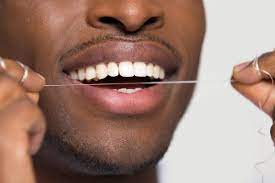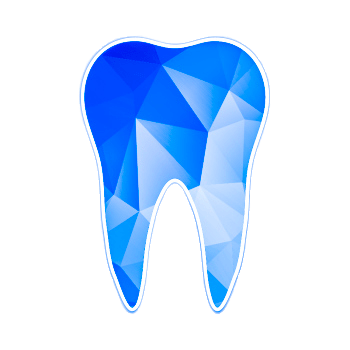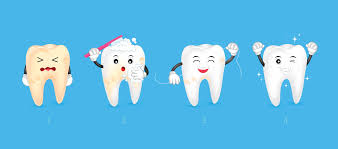Maintaining healthy teeth and gums is essential for overall health and well-being. Poor oral hygiene can lead to a host of oral health problems, including cavities, gum disease, and tooth loss. In this blog, we’ll share some tips for healthy teeth and gums to help you maintain good oral hygiene.
- Brush your teeth twice a day
Brushing your teeth twice a day is the foundation of good oral hygiene. Use a soft-bristled toothbrush and fluoride toothpaste to brush your teeth for at least two minutes each time. Make sure to brush all surfaces of your teeth, including the fronts, backs, and tops, as well as your tongue.
When brushing your teeth, be gentle and use circular motions. Avoid brushing too hard or using a back-and-forth motion, as this can damage your tooth enamel and gums. Replace your toothbrush every three to four months, or sooner if the bristles become frayed.
- Floss daily
Flossing is an essential part of oral hygiene that many people overlook. Flossing helps remove food particles and plaque from between your teeth and along your gum line. These are areas where your toothbrush can’t reach easily. Floss at least once a day, using a clean section of floss for each tooth.
To floss your teeth, break off about 18 inches of floss and wind most of it around one of your middle fingers. Wind the remaining floss around the same finger on your other hand. Hold the floss tightly between your thumbs and forefingers. Then glide it gently up and down between your teeth. Curve the floss around the base of each tooth and gently slide it beneath your gumline. Use a new section of floss for each tooth.

- Use mouthwash
Mouthwash can help kill bacteria in your mouth, freshen your breath, and strengthen your teeth. Choose a mouthwash that contains fluoride and use it after brushing and flossing.
When using mouthwash, pour a small amount into a cup and swish it around in your mouth for about 30 seconds. Spit the mouthwash out and avoid rinsing your mouth with water for at least 30 minutes afterwards. This is because this can dilute the effects of the mouthwash.
- Limit sugary and acidic foods and drinks
Sugary and acidic foods and drinks can erode your tooth enamel and lead to tooth decay. Limit your consumption of sugary and acidic foods and drinks. Additionally, brush your teeth after eating them if possible.
Sugar and acidic foods and drinks include candy, soda, fruit juice, and acidic fruits such as oranges and lemons. If you do consume sugary or acidic foods and drinks, try to do so during mealtimes. This is more advisable rather than snacking throughout the day. It can help reduce the amount of time that your teeth are exposed to these substances.
- Eat a healthy diet
Eating a healthy diet can help keep your teeth and gums healthy. Choose foods that are rich in calcium, such as dairy products and leafy greens. In addition to these, choose foods that are high in fibre, such as fruits and vegetables.
Calcium is essential for the development and enhancement of strong teeth and bones. On the other hand, fibre can help stimulate saliva production and wash away food particles and bacteria. Avoid foods that are high in sugar and starch, as these can contribute to tooth decay.

- Drink plenty of water
Drinking water can help rinse food particles and bacteria from your mouth, and it can also help keep you hydrated. Drink plenty of water throughout the day, and choose water over sugary drinks whenever possible.
In addition to water, you can also drink unsweetened tea or coffee. They contain antioxidants that can help protect your teeth and gums. Avoid drinking too much alcohol, as this can contribute to dry mouth. If you drink acidic beverages like soda or sports drinks, you should use a straw. This helps to minimize contact between your teeth and the acidic drink. This can help reduce your risk of tooth decay and erosion.
- Visit your dentist regularly
Regular dental checkups and cleanings are essential for maintaining good oral health. Visit your dentist at least twice a year, or more often if your dentist recommends it. Your dentist can check for signs of tooth decay, gum disease, and other oral health problems, and provide treatment if necessary. Moreover, your dentist can also provide you with recommendations to use to ensure your teeth are always healthy ad in good condition.
- Don’t smoke or use tobacco products
Smoking and using tobacco products can lead to a host of oral health problems. These include gum disease, tooth decay, and oral cancer In addition, tobacco also causes staining of the teeth, which affects their health. Staining also affects your smile and can lead to other dental problems such as tooth decay. Tobacco also contributes to mouth odour and causes bad breath. If you smoke or use tobacco products, quitting can improve your oral health and overall health.
In Conclusion…
Ensuring that we have good oral health is essential in maintaining the health of our teeth and gums. As shared above, there are many ways to ensure that we maintain optimal oral health. Prevention is always preferable to cure. In this sense, preventing dental conditions is always a better and more worthwhile solution than seeking dental treatment. Our experts at the Nairobi Sterling Dental Clinic are immensely knowledgeable and ready to help you attain optimal oral health. You can consult with us on any day by visiting us at the Park Suite Building, in Parklands, Nairobi. Additionally, you can also contact us to book an appointment, talk with our experts, or make inquiries about our services.

